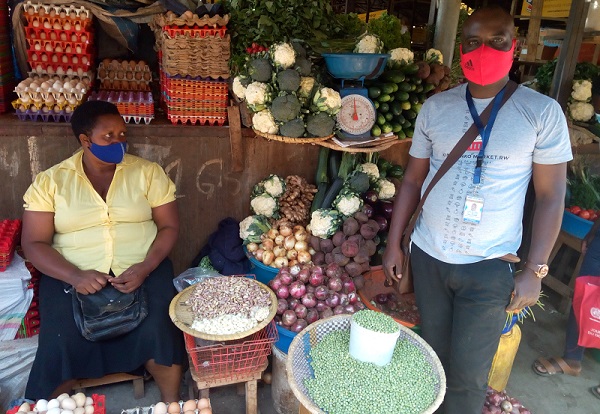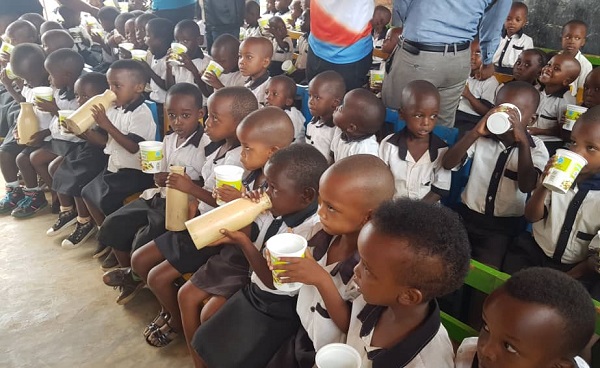
Kimironko food market: Across the country, wearing a mask is mandatory and one of the measures to combat COVID-19.
Kigali: The Covid-19 pandemic that hit the world this year has had negative effects on the nutrition of households in Rwanda, especially the most vulnerable to the point that there are risks of return to shunting for some families, this is the opinion of those interviewed working in the agri-livestock and nutrition sector.
“The consequences of Covid-19 have been manifold for farmers. We certainly live off agricultural products. But we do not produce everything for our food sufficiency. We have to buy what we don’t grow in the market in order to maintain good nutrition,” explains Jacques Nahimana, a farmer from Rambura Sector, Nyabihu District.
This article is published in the framework of the implementation of the Voice for Change Partnership Project (V4CP) with the financial support of the Netherland Ministry of Foreign Affairs via SNV-RWANDA and the International Food Policy Research Institute (IFPRI). The V4CP Project is collaborating with the Rwandan Consumer Rights Protection Organization (ADECOR) with the aim of enhancing the availability, accessibility, affordability, acceptability and increased consumption of fortified foods.
Nahimana deplores that during the confinement period, the exchanges suffered and their production of agri-livestock could not be sold on the market. Households survived by consuming only what they produce in their fields.
“School children have left boarding schools and are living with their families now, households with means are able to prepare sufficient and quality food for them. But some households without the means in villages or neighborhoods are unable to achieve food sufficiency. Famine is a reality for some. In short, insufficient food is a reality for some families. There are fewer self-sufficient households,” says Nahimana.
He adds that even the job market was had hit where some family members have lost their jobs following Covid-19 which has had an impact of reducing nutrition by 50% among agri-pastoralists.
“People who can offer work are not willing to do it, there is a feeling of fear and worry in the minds of many especially with no ready market for agricultural production. Disasters like recent torrential rains also destroyed crops and caused a lot of damages in many districts sweeping away crops and houses. Living conditions have become bad for some,” Nahimana observes.
It must be remembered that the districts of Gakenke, Nyabihu, Musanze, Ngororero, Rutsiro, Rubavu and other parts suffered due to heavy rains causing loss of life and significant damage to crops and infrastructure.

Shyaka Anastase, Minister of Local Government feeding a child
Fortunately, the State intervened to provide emergency assistance to the affected areas in rebuilding what had been destroyed.
Therefore, some people are convinced that without the help of the government, the population will not get out of serious poverty due to the Covid-19.
For pastoralists even cattle have nowhere to graze because pasture has been reduced due to flooding or erosion. As a result milk production has decreased while the available quantity has not been sold due to the lack of a market.
In Gishwati and Rutsiro, adds another farmer, the rains have damaged roads and some milk collection centers (MCCs) are no longer operational. Unsold milk has continuously been spoilt and eggs are no longer sold in hotels because they closed for lack of customers.
Even with the intervention of the State buying these products in some places, prices remain lower and households continues to experience lost revenue. All of this affects the population, which is seeing its economy fall, while prices of the commodities are rising.
In short, the implacable observation is that the purchasing power of the citizen has decreased because of Covid-19.

Children taking milk during a school feeding program
A light of hope
“A light of hope is emerging thanks to the free movement of goods and people that began in early June in preparation for the national reconstruction plan after the pandemic. We access markets to source a variety of products across the country. Transportation and various other services are provided. Life is getting better. This means that the consequences of Covid-19 tend to be reduced”, smiles Nahimana.
Nahimana then enumerates a series of recommendations to the Government: The Government must always strengthen strategies to combat the pandemic and that the various services provided improve the purchasing power of citizens. But food must also be available and increased.
The areas that have suffered damage as a result of the torrential rains deserve to benefit from designed lasting solutions.
The population should be supported to quickly produce the food required for household consumption and for the market. The state must encourage traders to reduce prices on the market to harmonize them with the purchasing power of consumers.
Above all, hygiene must be maintained in order to have healthy and quality food, while rigorously observing the measures to combat Covid-19. (End)
